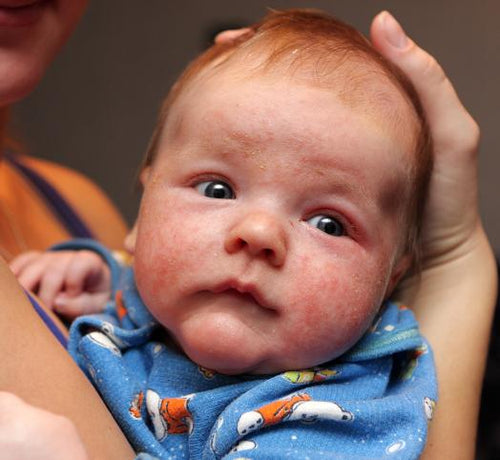Written in partnership with Dr Clarence De BELILOVSKY, dermatologist member of the Mustela circle of experts. Atopic eczema, also called atopic dermatitis, affects one in five children1. But atopic does not mean atypical. If the manifestations of this eczema are not pleasant (redness, itching, dryness, etc.), they are neither rare nor contagious for other babies and not irrevocable. More precisely, atopic eczema can appear from the age of two months (sometimes even before) and then fade or even disappear around five or six years of age. In the meantime, rest assured: care and little touches will help your baby. (Read about how to prevent the onset of atopic dermatitis) What is atopy? But let's start at the beginning. Where does atopic eczema come from? It is the combination of two key factors: a very reactive immune system and very dry skin. We speak of atopy when the immune system responds excessively when it is in the presence of allergens or certain environmental situations (Discover our advice at home in case of atopic dermatitis). This manifestation can be hereditary. Indeed, the probability of a child developing atopic dermatitis increases from 40% to 50% when one of the parents is also atopic, and from 50% to 80% when both parents are2. Other causes can explain its appearance, such as pollution or... too much hygiene! Yes, atopy is more important in industrialized countries than developing ones. What is atopic eczema and how to soothe it? Why does atopic eczema affect dry skin? Because they are more fragile. Usually, to protect itself, the skin forms a thin layer of water and fat (lipids) on its surface: the hydrolipidic film. In addition, it produces filaggrin, a molecule serving as “cement” to ensure its permeability. When lipids or filaggrin are not sufficient, the skin lets water evaporate. It loses its impermeability and no longer fulfills its role as a barrier against certain attacks: the door is open to let allergens pass through. To summarize: excessive reaction of the immune system + dry skin = atopic eczema if allergenic or particular environmental situation. This results in more or less inflammatory red patches (see How to recognize atopic skin). The skin is itchy and irritated... Which can affect the well-being of little ones, particularly the quality of their sleep. However, atopic eczema does not disrupt daily life. Between two outbreaks, there are periods of calm which can be extended thanks to a few simple daily precautions. Up to you ! 1 Sources: Watson 2011, Isaac 1998. 2 Sources: Böhme 2003, Taïb 2008.
- #Baby Care
- #Skin Types
What is extremely dry skin?
Updated on
July 19, 2024




